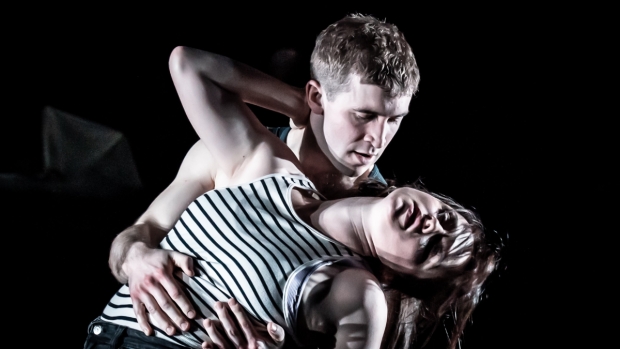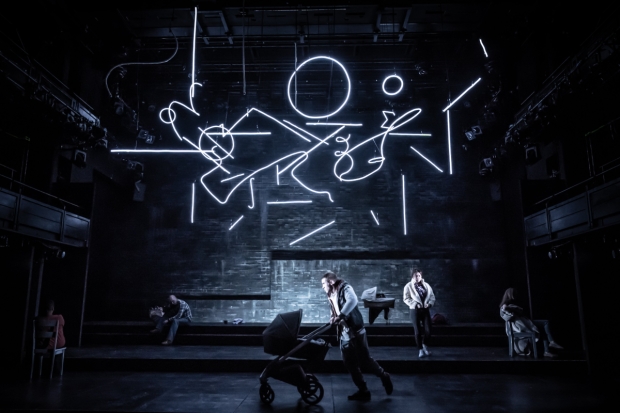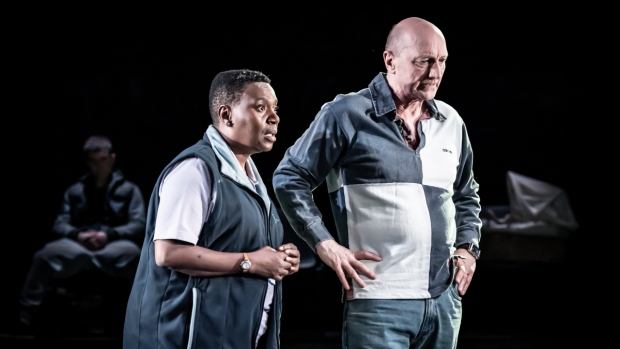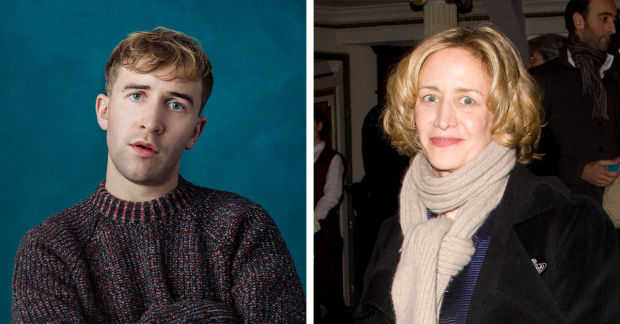”Romeo and Julie” at the National Theatre – two star-crossed Welsh lovers in a richly textured play

© Marc Brenner
If the second half features a couple of plot developments that tether it more closely to the Shakespeare original, Gary Owen’s marvellous play has by that point become so much its own special beast and the audience has become so invested in its bewitching protagonists, that it no longer really matters. Rachel O’Riordan’s gritty, explosive staging grips from the outset, the cast of five ricocheting through Hayley Grindle’s spare, grimy set as dance beats thunder and white neon flashes overhead, before coming to rest in a bleakly funny scene with 18-year-old Romeo cleaning up his freshly soiled baby girl while his judgemental, alcoholic mother looks on. The tone and feel is stark, urban, unforgiving… an unexpectedly abrasive backdrop to the tender if uneasy love story that follows.

© Marc Brenner
When this Romeo and Julie meet, she mistakes him for a homeless person, since he’s asleep at a cafe table in broad daylight, and he is blown away by her assertion that she’s going to get away to university. Her young life bursts with possibilities while so many doors have already been slammed shut on his. What’s beautiful though, is that for all the wariness and banter, she never talks down to him, taking time to explain her interest in physics when he asks, and we realise that her description of the theory of relativity versus quantum theory (“some things are tiny and massive at the same time”) could equally apply to this very meeting between two bright, unique souls.
Despite the obvious differences between them, it’s not hard to see what Callum Scott Howells’s Romeo and Rosie Sheehy’s Julie see in each other. Despite a gruff, nervy, gauche exterior, this Romeo is utterly charming with an unmistakable undertow of vulnerability. More than that, when he describes how he took charge of his baby daughter when the birth mother wasn’t interested, or when he sets off across the city to rescue his own mum from yet another drunken escapade, we realise, as does Julie, that this is an innately good man, one willing to sacrifice his own happiness to ensure other people’s. In a haunting but entirely truthful performance, Howells brilliantly suggests a figure for whom the flame of hope is dimming, but who can’t quite permit himself to let it fully extinguish.
Sheehy’s Julie is dazzling: warm, witty, fierce, supremely confident but never obnoxious. Watching her realise the sheer depth of feeling she has both for Romeo and his baby girl is profoundly affecting. The chemistry between the leads is combustible and it’s fascinating to note how, for all their strength and passion, they often seem to morph into children when in scenes with “grown up” characters, yet another detail in a production rich and alive with them.
In another gem of a performance, Catrin Aaron invests Romeo’s brittle mum with caustic wit. Paul Brennen is deeply moving as Julie’s father, adoring but becoming increasingly aware that he has nurtured a child he barely understands. He has a late showdown scene with Romeo that is breathtaking in its combination of ugly truth and pent-up emotion. Anita Reynolds completes a flawless cast as his partner, a professional carer so used to tempering her kindness with pragmatism that she almost doesn’t come through for her own adopted daughter. She gets a molten hot speech about the gulf between the staff in the caring professions on the ground and the toll the work takes on their lives, and the money-making bosses for whom “caring” is a commodity; it’s a stunning moment, still but furious, and Reynolds delivers it with power and economy.

© Marc Brenner
Owen’s writing is magnificent: taut, terse but theatrical, and often joyously crude. He finds the poetry in ordinary speech (at one point, Romeo says of baby Neve that “she breaks my heart every day, but every day it grows back”) and also the laugh-out-loud comedy in the absurdities of it. There’s a keen social conscience at work here, and every character is so richly textured, and presented without comment or patronisation. The play moves at a hell of a pace but has moments of compelling stillness, like little oases of comfort in the roiling drama of these imploding lives.
What with Standing at the Sky’s Edge, a collaboration with Sheffield Theatres, nightly yanking tear-stained audiences out of their seats upstairs in the Olivier, and now this life-enhancing co-production with Sherman Theatre Cardiff ensconced in the smaller Dorfman, the relationship with the National and some of its regional cousins has never looked more essential. Forget those kids on a balcony in Verona, Romeo and Julie is an absolute must-see. Gwaedlyd wych, as they say in Wales.











